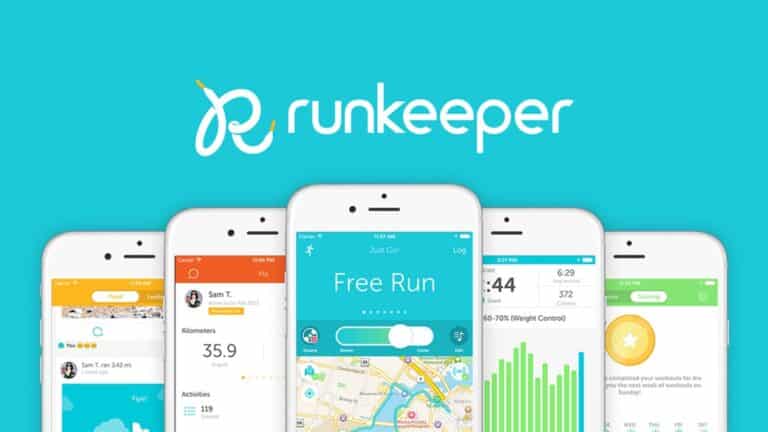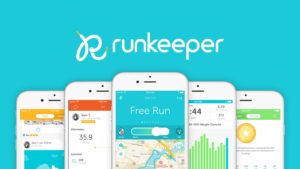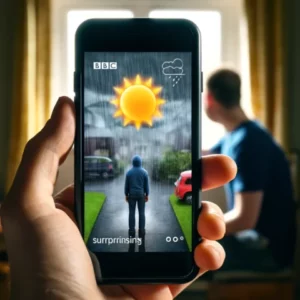For a reason, Asics Runkeeper is among the most famous running apps: it’s free to download, easy to use, and well-designed. It’s also really easy to use once you’ve downloaded it. You answer a series of questions to determine your goals — which can range from preparing for a race to enhancing your mental health — as well as your present level of running fitness.
You’re pretty much ready to go from there. You can modify your workout type simply under the activity settings – Runkeeper can monitor cycling, walking, swimming, rowing, and a lot else — however if you also want to run, go to Quickstart, push start, and go. The default setting sends audio metrics to your headphones every five minutes, and you can instantly disable this if you’d rather listen to music, nature noises, or the grumblings of disgruntled vehicles trapped in traffic.
What you will see here?
Runkeeper app: Free vs Paid
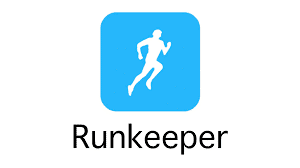
A free version of the Runkeeper app provides a lot of features, but if you want to access advanced analytics and also get greater insight into your data, customized training, and live-run monitoring, you’ll have to pay £29.99/$39.99 per year or £7.99/$9.99 per month for Runkeeper Go. You can, however, try out all of those services for free for seven days. The free edition offers some guided run and training plan options, including a novice 5k and 10k program, but the complete library — of which there are many — is only available as a subscription feature.
You can use the app that helps you set a goal for losing fat, getting healthier, or running a certain race. You can also go freestyle and establish your own goals, such as running a certain distance or agreeing to a certain number of sessions per week. The latter is where the reminder option comes in handy, as it can help you stick to your new healthy routine. Though Runkeeper is suitable for all levels of runners, it is particularly well suited to beginners or those who have dabbled in running but have yet to establish a consistent practice.
Interface and Features
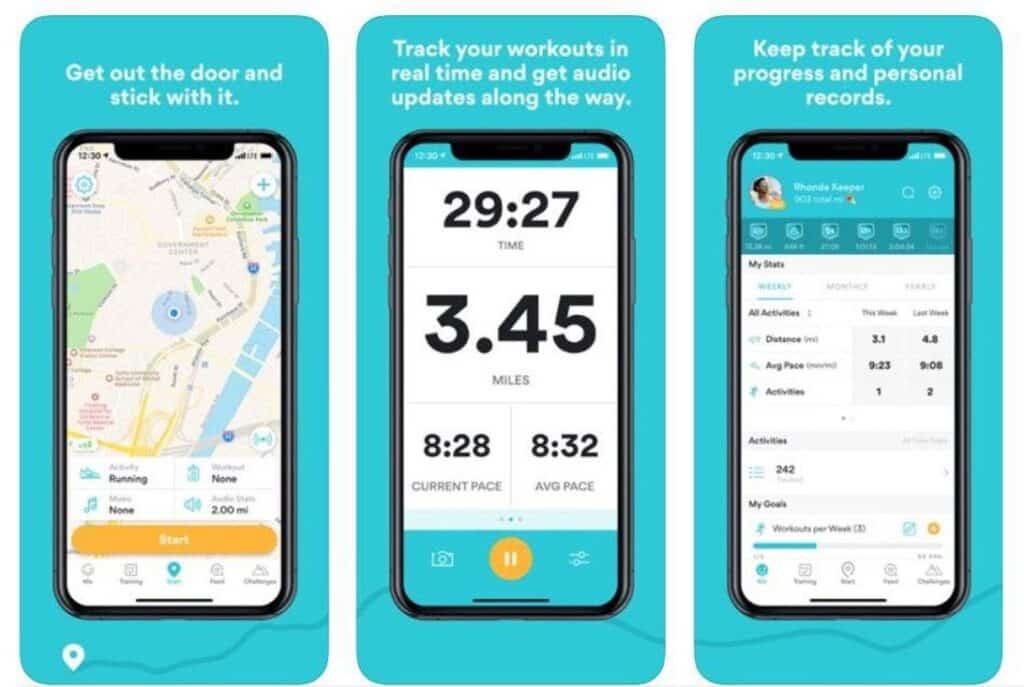
One of the favorite features of the Runkeeper app is how configurable it is and how simple it is to do so – after you’ve started an activity, you may easily change between running, cycling, walking, and a variety of other activities. Even if you’re in quick start mode and haven’t created an official program, you can set a goal for the day, whether it’s a specific distance, pace, or time of the run.
You may set the audio stats to inform you how you’re doing every five, ten, fifteen, or twenty minutes, or to notify you when you reach each mile or km. If you’ve enabled this but find that the interruptions are ruining your flow, you can simply turn them off from the run screen. We appreciated how you could customize the voice that gives the reminders, from a kind cop to a fearsome drill instructor. Another excellent feature is the ease with which your Spotify account and music library may be linked. The former even directs you to Spotify’s personalized running playlists, since you can always utilize your own carefully prepared inspiring jams.
Certain Particular speeds or distance
After you’ve completed your run, the app will ask you how you feel about it on a scale of ‘smiley face’ to a ‘sad face.’ It’s a basic but useful feature: if we look at the runs only based on metrics, we often forget how we felt at a certain particular speed or distance, so looking back on this may be useful. It’s also exciting for novices to observe their improvement from “that was awful” to “I can completely do this!”
The numbers design well, and you can quickly glance at your time and pace or dig further into your cadence, pace, elevation gain, and other factors. We also enjoy that your data generally include some type of positive reinforcement, even if it’s something as minor as “that it was your 2nd fastest run of such a distance within 5 and 7 kilometers.” A shoe tracker is another great tool if you have many shoes and would like to keep track of how many kilometers they have logged. After you’ve entered all of the information, all you have to do now is allocate the ones you wore during the run to have an overall total.
Runkeeper app: Smartwatch apps
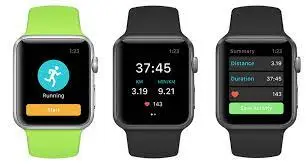
Runkeeper app includes an Apple Watch application that can use in conjunction with your phone or on its own if you want to leave the phone at home. Of course, accuracy is dependent on GPS, but you can still track if you will not have a Series 2 or newer; you just won’t get the map, distance, or average pace.
If you begin your workout on the watch, it will solely utilize the watch to track you; but, if you begin your run on your phone, you can use your Apple Watch as just a remote control, pausing, starting, and swiping it through screens to examine information like average pace & heart rate while on the move. If you’ve made custom workouts, they’ll show up on the watch as well, and if you’re on a training plan, it’ll show you the next run on your schedule.
Runkeeper is easy to connect with Garmin Connect so that you can import whatever runs you’ve done with a Garmin into your feed. Many other wearables, such as Fitbit and Withings, are in the same boat. Connecting these devices provides you with more data and statistics, especially if they track your heart rate. You may also use MyFitnessPal to track your progress.
Runkeeper app: Groups and Social
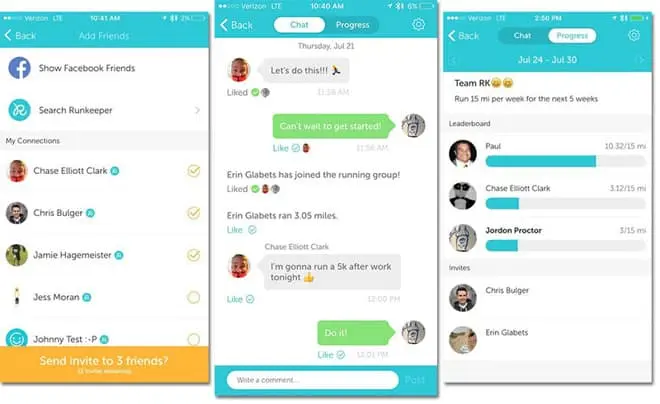
Your feed is located at the bottom of the primary Runkeeper app screen, in which you can see your activities as well as those of anyone friends you’ve linked with. It’s very simple to do so; either can use your phone contacts to identify folks who have already downloaded the app, or you can log in using Facebook. You can also ask your friends to take part. However, because these capabilities are rather low-key, you can remain anonymous and only track your running.
You’ll discover the Explore tab next to the feed, which will take visitors to races & challenges. The former just directs you towards the raceroster.com website. Whereas the latter allows you to build your running club and set tasks for them — or join one that already forms.
If you want to annoy your friends with your fantastic stats after every run, then you may connect Runkeeper to Facebook – just don’t blame us if they unfriend you.
Conclusion
It’s easy and that is why the Runkeeper app is popular software. It mixes a satisfyingly simple and well-designed ‘on the go’ interface with the opportunity to fully resource yourself and personalize your experience. We like how simple it is to start running or go for a highly structured, goal-oriented run by pressing the quickstart button. And one of our favorite aspects of Runkeeper is how wide and inclusive those goals are: They’re not just performance-oriented, focusing on times or miles. But they also include mindfulness & positive mental health running alternatives.
The auto pause option should halt your timer. If you do get held at a traffic signal without having to pause, seems insensitive & slow to react. This is also the situation with MapMyRun, and it appears that only Strava’s phone app works well with this feature. Similarly, if social sharing & challenges are important to you, Strava is the way to go. Runkeeper, on the other hand, is unbeatable for keeping track of runs and sticking to a regimen.
Read more:
- Apple Watch and activity tracking: Everything you need to know!
- Customize Maps with Map settings on your iPhone and iPad!
- Nike Run Club: A preferable and simple training app to use!
- ‘My Activity in your Google account- How can you delete it or turn it off?
- Adidas running app: Here’s what you will love about the Adidas running app!


